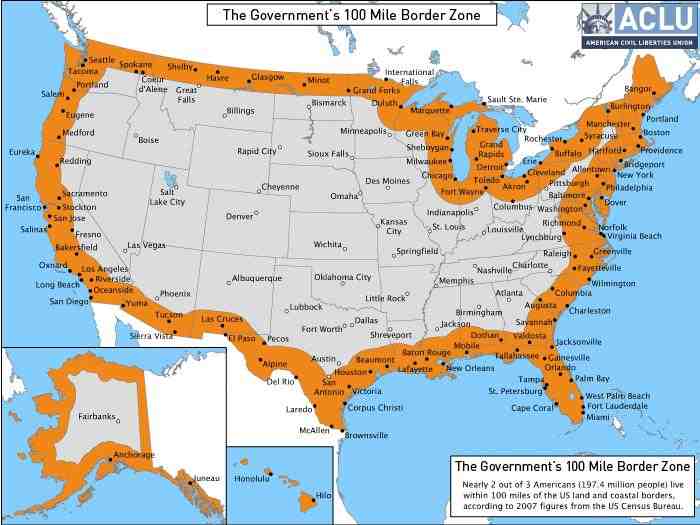 By Joe Wright
By Joe Wright
Still unknown to much of the U.S. population is the fact that they reside within a “Constitution-Free Zone,” as it has been dubbed by the ACLU for many years. In fact, it is estimated that 200 million people (2/3 of the populace) are likely to have their 4th Amendment protections completely disregarded by border patrol, as well as to encounter other routine violations unbecoming to a land of the free.
The entire state of Maine, for example, lies within a 100-mile region that extends inward from all borders of the nation as shown in the image below.
This reality appears to be crystallizing with more of Maine’s residents, as “daily citizenship checks” have begun to spread to buses across the state, according to a report from Maine Public:
The U.S. Border Patrol is running daily citizenship checks on buses traveling from Fort Kent toward the state’s interior and making periodic checks on buses originating in Bangor.
[…]
“Our purpose for boarding any conveyances, a bus specifically in this case, would be to question anybody – anybody – about their right to be or remain in the United States, whether they are an alien or not,” says Heibert (chief patrol officer). “That’s kind of the gist of it. We would have to have a reasonable suspicion to think that somebody isn’t a citizen to continue questioning.” (emphasis added)
This type of “fishing expedition” flies directly in the face of the 4th Amendment which guarantees that “The right of the people to be secure in their persons, houses, papers, and effects, against unreasonable searches and seizures, shall not be violated, and no Warrants shall issue, but upon probable cause, supported by Oath of affirmation, and particularly describing the place to be searched, and the persons or things to be seized.”
Nevertheless, the Constitution-Free Zone, while not an official designation, has been upheld in principle by federal judges who the ACLU argue are reinforcing an outdated concept that was never given a mandate by the people. The ACLU itemizes this overlooked part of history on their website:
Outdated Legal Authority and Lack of Oversight
- The regulations establishing the 100-mile border zone were adopted by the U.S. Department of Justice in 1953—without any public comments or debate. At the time, there were fewer than 1,100 Border Patrol agents nationwide; today, there are over 21,000.
- The Border Patrol often ignores this regulation and rejects any geographic limitation on agents’ authority. At least two federal circuit courts condone Border Patrol operations outside the 100-mile zone, federal regulations and Supreme Court precedent notwithstanding.
- Federal border agents are stopping, interrogating, and searching Americans on an everyday basis with absolutely no suspicion of wrongdoing, and often in ways that our Constitution does not permit.
- For example, Border Patrol, according to news reports, operates approximately 170 interior checkpoints throughout the country (the actual number in operation at any given time is not publicly known). The ACLU believes that these checkpoints amount to dragnet, suspicionless stops that cannot be reconciled with Fourth Amendment protections. The Supreme Court has upheld the use of immigration checkpoints, but only insofar as the stops consist only of a brief and limited inquiry into residence status. Checkpoints cannot be primarily used for drug-search or general law enforcement efforts. In practice, however, Border Patrol agents often do not limit themselves to brief immigration inquiries and regularly conduct criminal investigations and illegal searches at checkpoints. The Border Patrol also frequently pulls over motorists in “roving patrol” stops, often without any suspicion that an immigration violation has occurred.
- The ACLU has documented numerous cases of abuse by Border Patrol and filed lawsuits to obtain more information about the agency’s practices. Given Border Patrol’s lack of transparency, and in the absence of any meaningful oversight, there is still much that we don’t know about the full extent and impact of these interior “border enforcement” operations.
As the video above introduces, the definition of “border patrol” no longer means dealing strictly with human agents. The deployment of drones, biometrics, DNA collection, electronics searches and even social media checks are spreading as well.
Notwithstanding these increased intrusions, it appears that if one Maine bus line operator is to be believed people are all too happy to embrace a perception of security instead of a feeling a profound loss for their freedom to travel unmolested:
The general manager for Cyr Bus Line, Rick Soules, says he doesn’t often hear from customers or drivers about the patrol checks, but when he does, it’s positive.
“The feelings I get generally from people regarding the border checks are that it’s a safety check, which provides security for the people riding the bus, and that they’re not put out by that,” says Soules.
As the country continues to debate immigration, it would be wise to consider the increasing size of the web that is being built and whether we are willing to continue giving up the protections that should be enshrined to keep the innocent from being ensnared.
You can find more from Joe Wright at Activist Post, where this article first appeared.
Support us at Patreon. Follow us on Facebook, Twitter, Steemit, and BitChute. Ready for solutions? Subscribe to our premium newsletter Counter Markets.
Top image: Pixabay
Source Article from http://feedproxy.google.com/~r/ActivistPost/~3/lngA4YfWjjM/papers-please-border-citizenship-checks-buses-across-maine-highlight-constitution-free-zone.html
Views: 0
 RSS Feed
RSS Feed

















 January 27th, 2018
January 27th, 2018  Awake Goy
Awake Goy 

 Posted in
Posted in  Tags:
Tags: 
















